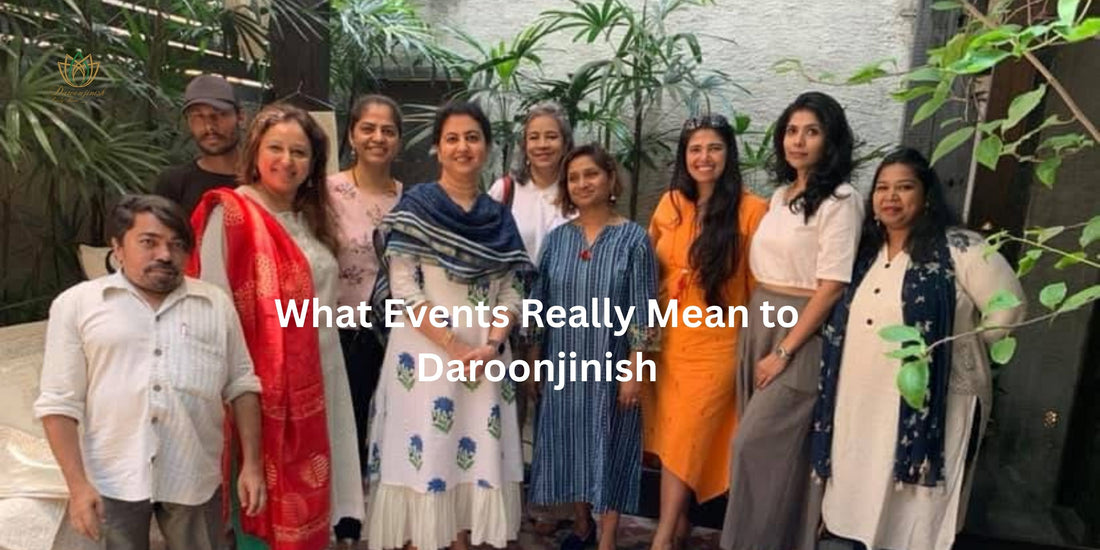
From Stalls to Stories: What Events Really Mean to Daroonjinish
Share
It always starts with a basket. Or maybe a placemat. Someone walks up, picks up a piece, turns it over in their hands, and asks:
"Is this handmade?"

And just like that, a conversation begins—not about a product, but about a story.
At Daroonjinish, events are not just places where we show what we do—they are spaces where we connect, listen, learn, and give back. Every time we set up a stall, we carry not just our products but the hopes, history, and hard work of the artisans behind them. We carry the soul of Bengal in woven form.
The Conversations That Stay With Us
There was a woman in Mumbai who walked up to our booth with her 8-year-old daughter. She had bought one of our storage baskets a year ago.
“I use it for toys,” she said. “But she calls it ‘the magic box.’ She thinks it refills on its own every time it’s empty.”
We laughed. But inside, we melted.
These are the moments we live for. They remind us that the things we create become part of people’s lives—in quiet corners and small ways. At every event, we meet people who don’t just buy Daroonjinish pieces—they adopt them into their homes, into their stories.

Design with a Heartbeat
Our exhibitions aren’t just about sales. They’re about conversations and community. We meet first-time customers who want to shop consciously. We meet returning customers who stop by just to say how a tray changed their dining table energy. And in between all that, we listen carefully to people’s needs—what they’re drawn to, what holds them back, and how they think about spending on handmade goods.
This helps us shape products that are not only beautiful but deeply relevant.
Because let’s face it—not everyone walks in with the same buying power. Some are curious, some are cautious, some are saving up.
And that’s okay. We’re not just here to sell—we’re here to understand.
Craft That Gives Back
We’ve always believed that impact must run deeper than profit. That’s why, at select exhibitions, we contribute a percentage of every sale to organisations supporting women and children at risk.
It’s not a “CSR activity.” It’s part of who we are.
Because the hands that weave our baskets? They belong to women who have faced silence, stigma, and struggle—and turned it into strength. Supporting other women through our work feels like closing a beautiful circle.
Our participation in these events has also been supported and recognised by the Australian Consulate in Kolkata, India, a gesture that gives us not just visibility, but responsibility. It reminds us that every booth we set up can be a small force for change.
One of our proudest moments
One of our proudest moments was when our founder was invited to speak at the U.S. Consulate in Kolkata.

She stood in a room full of diplomats, designers, entrepreneurs—and spoke not about profits or growth charts, but about a different kind of revolution.
A quieter one. Woven, not shouted.
"We wanted to reframe what a ‘beautiful home’ means," she shared.
"Not just for the rich. Not just for those with drawing rooms and designer lighting. We wanted our pieces to belong in the homes of middle-class families, roadside dwellers, and people building their lives one hopeful decision at a time."
The room was silent. And then it clapped.
That speech wasn’t just about Daroonjinish—it was about a larger dream. One where aesthetics are not a privilege, but a possibility.
Handmade doesn’t mean fragile.
Rural doesn’t mean outdated.
Beauty belongs to everyone.
The Bengal No One Talks About
Behind every product we showcase lies a story of Bengal—not just its craft, but its complexity.
The political landscape here hasn’t been kind to artisans. Frequent strikes, broken logistics, delayed payments, lack of digital access—these are everyday hurdles. Materials arrive late, deliveries get disrupted, and workshops sit idle for weeks.
But even then, the women we work with keep showing up.
They spin, they stitch, they smile.
They don’t ask for charity. They ask for the opportunity.
And every event we attend is one more way to give them that—to take their work outside the state, outside the country, and place it on a pedestal it deserves.

So Why Do We Show Up?
Because events are our living room. Our studio. Our community centre.
They’re where we’re not just seen, but heard.
Where we’re not just selling, but serving.
And where we’re reminded, again and again, that Daroonjinish is not just a business. It’s a bridge.
So next time you see us at an event, come say hi.
Touch the baskets. Ask questions. Tell us what home means to you.
Because when you speak, we listen. And when we create, it’s for you.
